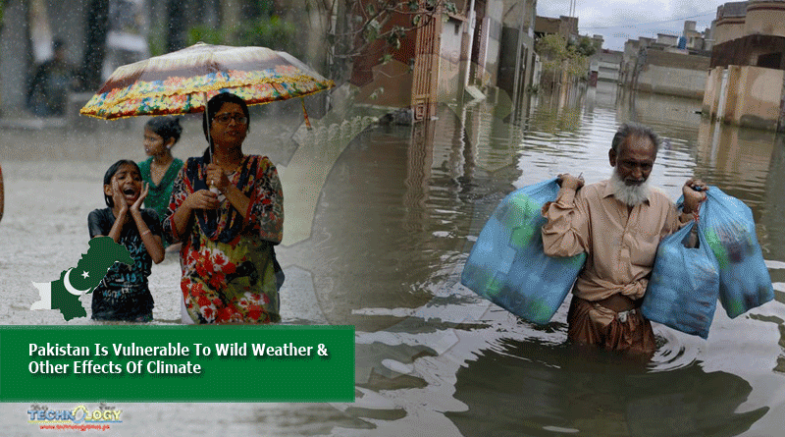Torrential Rainfall In Pakistan Claimed More Than 100 Lives Last Week, While Causing Widespread Property And Infrastructure Damage Due To Wild Weather

The southern port city Karachi was thrown into chaos. Residential and commercial areas were submerged, and power outages disrupted life for days.
Climate scientists say Pakistan is especially vulnerable to wild weather and other effects of climate change including, sea intrusion, unusual rain patterns, glacial melting, rising temperatures and drought.
The government in Islamabad says it plans to take action for its Wild Weather, but Pakistan’s climate change challenge is formidable.
Water woes
Arid Pakistan has been facing stronger monsoons that what has been seen in the past.
“In 2018, the total rain recorded in Sindh province during monsoon season was just 1 millimeter (0.039 inches). But in 2019, it was 323 millimeters (12.7 inches), and so far this year we have seen rainfall totaling 450-500 millimeters,” climate expert Javed Memon told DW
The Arabian Sea has also been heating up, with the average surface temperature increasing from 29 degrees Celsius (84.2 Fahrenheit) to 31 degrees in just two years, according to Memon.
This has fueled the formation of storms that push the sea into coastal communities. “The Indus River delta has been badly affected by sea intrusion that harms people’s livelihoods,” he said.
Environmental activist and chairman of Pakistan’s Fisherfolk Forum, Mohammad Ali
Shah, told DW that the problem in the Indus delta is being exacerbated by dam construction.
“The construction of dams had already reduced water flow into the Indus delta, and forcing 1.2 million people to migrate,” he said.
One estimate shows a hundred acres of arable land being destroyed every day because of sea intrusion, according to Shah. Mangrove forests are also disappearing.
Trees, smog and e-mobility
Khial Zaman Orakzai, a member of Pakistan’s parliamentary climate change committee, told DW that Pakistan’s government is addressing climate change with projects like tree planting, electric mobility and campaigns to reduce emissions.
One project in the remote northwestern frontier province, Khyber Pakhtunkhwa (KP), aims to plant 1 billion trees.
“We planted over 1 billion trees. In 2014, the total forested area of the province was just 20%, now it is 26%,” district forest officer Shakeel Ahmed told DW. “We will get more plants from the federal government’s 10 billion tree project that will further increase forest coverage and help improve the ecology of the province.”
Smog is another big problem in Pakistan’s industrial eastern Punjab province, where winters in the provincial capital, Lahore, are choked with smoke. Thousands of brick kilns contribute to the problem, and authorities say they are addressing the issue.
Muhammad Ali Ijaz, a senior official at Pakistan’s Environmental Protection Agency, told DW that “zigzag” methods of kiln production have been introduced to lower smoke levels.
“There are 359 industrial units contributing to pollution in Lahore that are being monitored now. The zigzag technology was introduced for brick kilns some years ago and 33% of the brick kilns have already been converted to the technology,” Ijaz said.
The government has also been working to promote electric energy and mobility to reduce overall emissions and improve air quality. “We have come up with an electric vehicle policy, aiming to have 150 buses powered with electric batteries,” said Orakzai. A station has already been set up in the national capital, Islamabad.
The government has also scrapped two coal power projects and is trying to generate 30% of total electricity through renewable means in the coming years. “If we add hydro power projects then the total renewable power generation would be around 60%,” according to Orakzai.
Not enough
Environmentalist Memon has said that the government initiatives have missed the environmental issues that really matter.
“There is no point in launching tree planting drives and promoting coal simultaneously. We need to transfer completely to wind and solar,” he said.
Lahore-based analyst Ahsan Raza added that there have been problems with implementing initiatives.
“Imported plants are being planted that could do harm to the environment. No environmental impact assessment of these plants is being conducted. The government is planning river and seaside urban developments, which portend more environmental disasters,” Raza said.
However, Islamabad-based development expert and environmental activist Amir Hussain told DW that change will take time.
“In Punjab, they are restoring the biodiversity of Ravi river’s basin and coming up with an anti-smog policy in the province and promoting vertical development of cities, leaving more space for parks and plantations. Similar policies are also being implemented in KP,” he said.
“These policies will take some time to show their impact, but there is no doubt that the government seems sincere in addressing the issue of environmental pollution.”
This news was originally published at taiwannews.com
